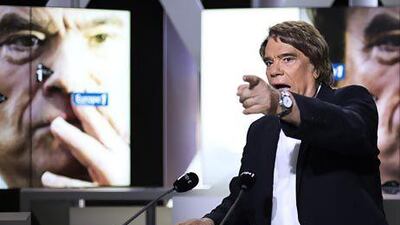Last month, a French politician and businessman, Bernard Tapie, is showing that the freezing of assets is not limited to Middle East former dictators.
The French daily newspaper Le Monde revealed in July that investigating judges had ordered the seizure of many of the controversial captain of industry's assets.
Ownership of a mansion on Paris' Left Bank and a villa in Saint-Tropez, bank accounts, insurance policies and his stake in a newspaper group were all taken into official hands. The move was widely interpreted as signalling the authorities' belief Mr Tapie was the principal beneficiary of funds acquired by fraudulent means, and he was furious.
"Frankly," an indignant Mr Tapie exclaimed, "I didn't know I lived in a country where you could be executed without being convicted. It's like death before the death."
He claimed the authorities had indicted him to justify confiscating his possessions.
Now 70, Mr Tapie, a metalworker's son who has experienced ministerial office, the height of corporate power and also prison cells in his eventful career, is at the centre of inquiries into a 2008 arbitration settlement awarding him €403 million (Dh1.95 billion) against the state in compensation, interest and damages for moral injury.
The claim arose from a legal battle over the sale in the 1990s of the sportswear company adidas, the most prominent example of Mr Tapie's speciality of buying companies in distress.
He had purchased it for 1.6bn French francs (now about €245m) in 1989, using money borrowed from the Credit Lyonnais bank, then in public ownership. When, in 1992, he struggled to meet interest payments, Credit Lyonnais took control of adidas.
The bank sold it the following year for €683m, more than 50 per cent more than the amount he still owed.
The dispute over the sale rumbled on for 15 years, with Mr Tapie claiming to have been swindled by the bank, which has since been privatised before being taken over by Credit Agricole.
His handsome victory in 2008 was quickly followed by suspicion and the attentions of judges and investigative journalists. There is speculation the tentacles of inquiry reach the very top - the office of Nicolas Sarkozy, the former French president.
At one point Christine Lagarde, who was Mr Sarkozy's finance minister and is now the managing director of the IMF, seemed in danger of having to answer for her alleged role.
She had accepted the decision of the arbitration proceedings, later explaining that she saw the outcome as "the best solution at the time".
After questioning by the investigating judges examining the alleged fraud, she was given the status of material witness. French media have speculated that her explanations when questioned cast suspicion on some of those around her at the time.
But amid the intrigue surrounding the judicial investigation into how Mr Tapie came to benefit so lavishly, the identities of those under suspicion have shocked even a country accustomed to steep falls from grace by public figures.
Pierre Estoup, one of three judges in the arbitration process, is also under formal investigation for alleged organised fraud along with Maurice Lantourne, Mr Tapie's lawyer at the time, Jean-François Rocchi , a former top civil servant, and Stéphane Richard, who was Ms Largarde's chief of staff and is currently one of the great leaders of French industry, as head of the telecommunications giant Orange.
For Mr Tapie, the case represents the latest twist in a snake-and-ladders life in which he has risen and fallen, then risen again only to risk another fall.
Born in the 20th arrondissement of Paris, Mr Tapie has had a rich variety of roles including business tycoon, president of Marseille football club, triumphant Tour de France team owner, minister for city affairs, actor and singer.
His purchase of joint ownership of a newspaper group that includes important regional dailies was a classic example of the wealthy man who, like Robert Maxwell and Conrad Black before him, loathes journalists but cannot resist possessing a chunk of the press.
He harbours a bitter grudge against authority over his imprisonment for several months in 1995, after he was convicted of bribing players from the northern France football club of Valenciennes to go through the motions against Marseille ahead of a Champions League final.
Since undergoing the latest questioning, Mr Tapie has vehemently denied any wrongdoing. He has vowed to fight the sequestration of his assets and to clear his name.
Indeed, some observers acknowledge that when he insists he was cheated over the adidas sale, he has a point.
His alleged partners in crime publicly or privately insist they are innocent, too.
Equally, no one underestimates the seriousness of this latest blow to the reputation of French public life.
Francois Bayrou, the leader of the centrist Democratic Movement party, summed it up: "If proved, this will be the gravest scandal in the history France's fifth republic [covering the 55 years of the current constitution]."


